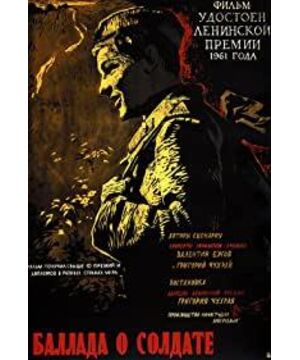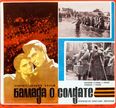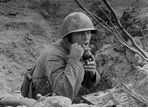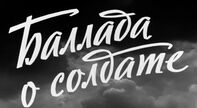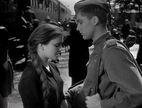This is the second film directed by Gregory I have watched. It will inevitably be compared with "Forty-first", and the two are indeed a bit similar.
The background of "Forty-first" is the Soviet Civil War, and the background of "Song of the Soldiers" is the Soviet Union's Great Patriotic War. In the love line of the male and female protagonists, the director gave them a closed space and slowly cultivated their feelings. In this regard, Gregory should be a romantic idealist.
"Forty-first" tells the story of what happened when the white army man and the red army woman were trapped on a desert island. The white army man is a nobleman, while the red army woman is a poor man. Although the red army woman has never read a book, she likes poetry. Because the white army man is sick, the red army woman has been taking care of him. Although the two have different ideologies, they also have a good impression. The white army man tells the red army woman Poetry, telling "Robinson Crusoe", the body slowly recovered health. Until one day, a boat floated from the sea. The white army man recognized that it was his own and ran towards the boat. The red army woman watched all this from behind and shot the white army man without hesitation. The forty-first enemy shot by the heroic Red Army woman.
"Song of the Soldiers" Alyosha and Shula also met and even fell in love in the haystack carriage. One is a hero on the battlefield, and the other is an ordinary civilian girl. From misunderstanding to trust, except for the background of war, they are two young and lovely girls.
In both films, this closed place is a place where feelings heat up, but it can be felt that Gregory is more gentle in the latter. In "Forty-first", the white army man and the red army woman are more dependent on the catalyst in a closed environment, and they are delusional as love by the parties. It is evident from the comparison of the white army man to Robinson and the comparison of the red army woman to Friday. Although the Red Army girl did fall in love with her enemy, the soldier was a soldier after all, and she held the gun to her "blue eyes".
In "Song of the Soldiers", Alyosha missed the train because Shula wanted to drink water, but the two didn't say goodbye. Shula got off at the next stop and waited for Alyosha, and the two went to deliver soap together. , spent a wonderful day or two of the war. Everything went smoothly in between, no air strikes, no separation, and even the details of getting on the train made people smile. 19 years old, what a good age, what a pure, kind and lovely young man, even making people forget the war for a short time.
By contrast, the sidelines of "Song of the Soldiers": young husbands on the front lines, young wives at home, is a love that is both sad and overly serious.
At Alyosha and Shula's separate station, Shula confessed that there was a soldier's fiancé who lied to Alyosha. Fortunately, the two did not make any promises to each other in the end.
After several twists and turns, Alyosha returned home, a long shot of his mother running all the way from the field, a close-up of the mother and son embracing, the silence, the neighbor's aunt's "Have you seen my Ivan?" "When will the war be fought?" Pulls the audience back from the ephemeral pink to the realistic gray.
A soldier is a soldier after all. At the end of the film, Alyosha jumps into the car and prepares to return to the battlefield, shouting to his mother "I will be back, mother", but the opening film already tells us that "Alyosha will not come back".
View more about Ballad of a Soldier reviews


